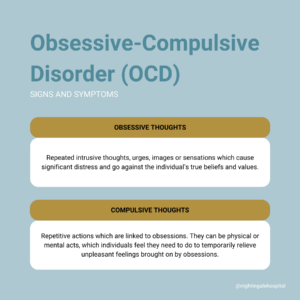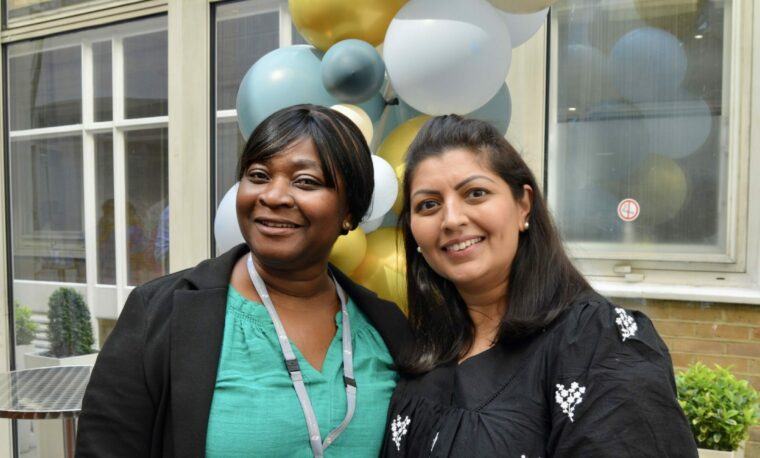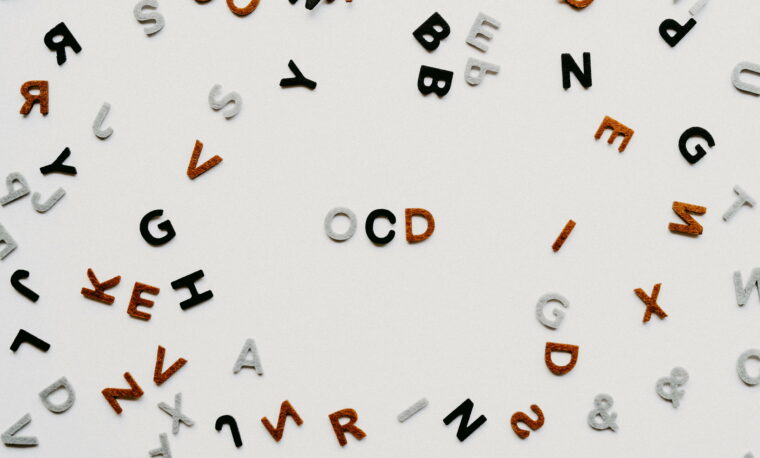What is the OCD and related disorders day therapy programme?
The Nightingale Hospital OCD and related disorders day therapy programme is dedicated to treating patients with obsessive-compulsive disorder (OCD) and OCD-related disorders such as body dysmorphic disorder (BDD), health anxiety and emetophobia.
The OCD treatment programme is designed as a 2-day per week, 6-week day patient treatment programme to support patients transitioning from primary inpatient care or for those who do not need inpatient care. The treatment is delivered as a face-to-face programme at our location in Marylebone, London.
Programme overview
Multidisciplinary team
The specialist multidisciplinary team is led by Sumitra Patel, the Day Therapy Lead. The team also includes other BABCP-accredited CBT therapists, psychological therapists and occupational therapists.
Treatment
The treatment programme has been developed in line with the National Institute for Health and Care Excellence (NICE) guidelines for OCD and BDD. The OCD treatment programme is focused on cognitive behavioural therapy (CBT) and the integration of self-directed exposure tasks, comprising of both group and individual sessions.
Therapy programme
The programme combines psychological therapies, exposure groups and creative therapies delivered by an experienced team of therapists. It is designed to support individuals to utilise strategies learnt in therapy and develop independent coping. The specialised day programme caters for a small number of patients during any one programme. This allows patients to receive tailored support, while also receiving the benefits of the therapeutic group environment.
The OCD day therapy programme is a 2-day per week, 6-week programme. The programme will be run on Tuesdays and Thursdays from 9:30am – 4:30pm. A patient’s one-to-one session with a therapist may fall outside these times.
The day therapy programme offers each patient:
- Six one-to-one sessions during the programme with a therapist, tailored to the patient’s specific needs.
- A weekly timetable specific to the OCD day therapy programme, comprised of a mixture of groups. Each day, patients will have three therapy groups.
- Support from staff with exposure task planning and evaluation.
Funding
The programme can be accessed via self-funding options. Patients will be required to provide a deposit before commencing day treatment.
The next steps
All patients of the OCD day therapy programme must be under the care of a Nightingale Hospital consultant psychiatrist.
I am an individual or loved one
- Make an enquiry: To enquire about this programme, please contact our Patient Services Team by filling out an enquiry form. Alternatively, you can telephone +44 (0)20 7535 7732.
- Assessment with a Nightingale Hospital consultant psychiatrist: Our Patient Services Team will connect you with an appropriate consultant psychiatrist to provide a psychiatric assessment. Based on this assessment, if you may be suitable for the programme, the consultant will complete a referral to the Day Therapy department.
- Free pre-commencement assessment with a therapist: A therapist will provide a free pre-commencement assessment. This session will focus on reviewing your current difficulties and exploring your expectations and goals for treatment. This helps us to explore your individual needs and ensure we are offering the most appropriate and effective OCD treatment for you at the time. We can arrange for the assessment to take place online or in-person. Following this assessment, a decision will be made regarding the suitability of the OCD treatment programme and if appropriate, you will be offered a place in the OCD day therapy programme.
I am a GP or referrer
If you are a GP or health professional, you can refer a patient to this programme by using our online referral form.
OCD day therapy programme FAQs
- Most people with OCD will suffer from obsessive and/or compulsive thoughts.
Obsessive thoughts are repeated intrusive thoughts, urges, images or sensations which cause significant distress and go against the individual’s true beliefs and values.
Compulsive thoughts are repetitive actions which are linked to obsessions. They can be physical or mental acts, which individuals feel they need to do to temporarily relieve unpleasant feelings brought on by obsessions.
For more information, please visit our pages on obsessive-compulsive disorder (OCD) and body dysmorphic disorder (BDD).

- Please make an enquiry with our Patient Services Team who will send you an example timetable of the OCD day therapy programme.
- The cost of the day therapy programme is a full-day of day therapy. Please contact our Patient Services Team who can send you the current prices for day therapy.
- A new OCD day therapy programme generally begins every 6-8 weeks. Please speak with our day therapy team who can advise you of the next programme intake date.
Other support for OCD and related disorders
Nightingale Hospital also offers a specialist OCD and related disorders inpatient unit as well as outpatient support. The inpatient unit is especially suitable for individuals experiencing severe distress and impairment as a result of their condition or who could benefit from an intensive programme of inpatient treatment with nursing support.











